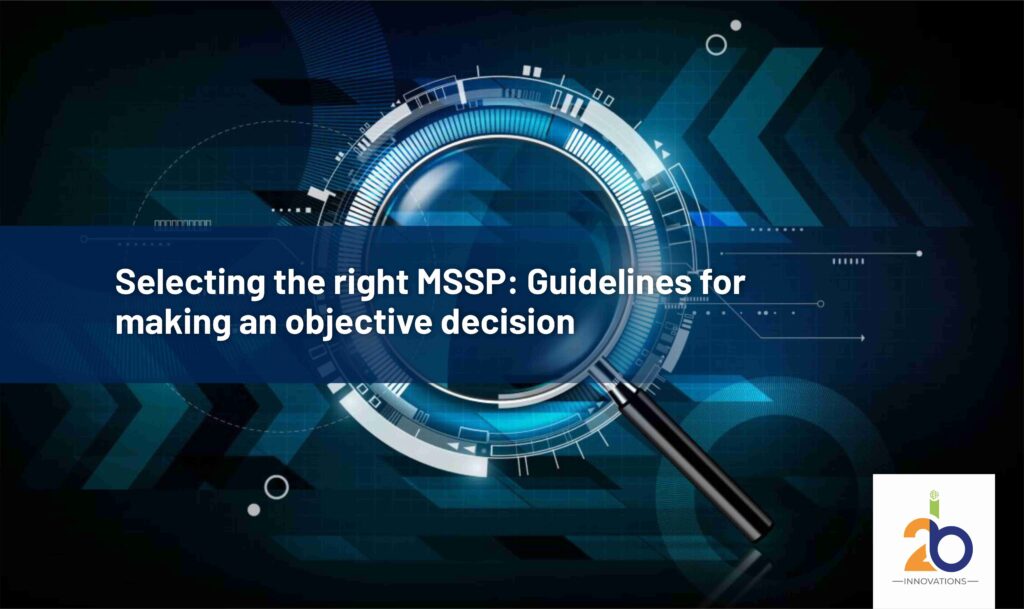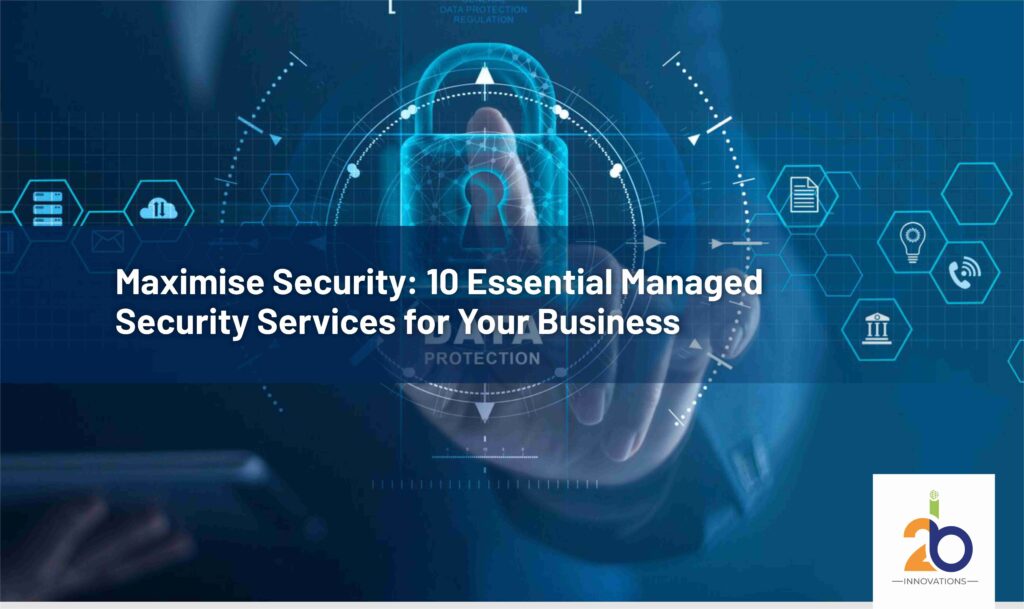
Recently, a new trend has emerged where companies that want to outsource their security services are opting for managed security service providers (MSSPs). Regarding market trends, there is tough competition in MSSPs, making it hard for businesses to determine which would suit their needs. In this article, we’ll help you to choose an MSSP with appropriate information about the pros and cons of using an MSSP.
If you are looking ahead to make a wise decision regarding MSSP, then look ahead for the enlisted points-
What services does my business or organization need?
Why does my business or organization require MSSP?
When is the right time for my organization to join MSSP?
Who should offer the MSSP service?
MSSP Services
Let’s start with the services we may expect. To initiate, let’s begin with the services that you may be looking for in MSSP.
Security Monitoring
Anytime, anyplace, tracking a business’s networks, systems, and apps to find possible security risks and strange behavior can be done on-site (when data can’t leave the customer’s infrastructure) or as a service.
Incident Response (IR)
Starting to look into threats and leaks and making sure they are over. When someone responds to an incident, they can either advise the customer’s incident response team or agree on what steps to take in the customer setting.
Managed Detection and Response (MDR)
We are collaborating on the Security Monitoring and Incident response altogether. Due to its more advanced danger detection methods, MDR is usually seen as a step forward from traditional monitoring and response services. Aside from that, MDR has built-in response features that are managed and provided by the service provider.
Threat Intelligence (TI)
Threat Intelligence is all about informing the organization of the threats to its security that are happening now or will happen in the future. IoC feeds are the most popular and well-known type of TI. They let you know when recognized signs of an attack are found in a customer environment. On the other hand, other products are made for the company’s different levels of experience of TI users.
As a reminder, TI can’t hire someone else to do the protection work because they need their team. Company use is the only way for TI information to be useful.
Managed Security Solutions
Several services are all about managing security solutions that are put in place in customer settings. If a customer wants to use MSSP tools on-site, these services are often sold together.
A wide range of services aren’t directly related to day-to-day business but are still useful once or regularly.
Digital Forensics and Incident Response (DFIR) or Emergency Incident Responder
DFIR is one of the best types because of the services it offers in case of major incidents in the customer setting.
Malware Analysis
A narrowly focused service that gives detailed reports and analyses of how malware acts when it is sent in. The service needs an in-house team to use the research results correctly.
Security Assessment
This group of services mainly aimed to find holes, weak spots, and possible attack routes in target systems or applications. Examples include Penetration testing, application security assessment, red teaming, and vulnerability assessment.
Attack Surface Management (ASM)
An information-gathering service for the company’s public-facing assets.
Digital Footprint Intelligence (DFI)
A service whose main job is to look for, collect, and analyze organizational threats from outside sources. As usual, the outputs include details about leaked accounts, malware logs that show ties to the organization, posts and ads for selling access to infrastructure, and a list of people who can attack the organization. DFI took over many of TI’s jobs that involved processing external sources.
We can see that some services, like monitoring, MDR, and evaluation, can do the job of the in-house team completely. In contrast, others, like TI, malware analysis, and DFIR, can be considered extra help for the already there team. The most common way to use an MSSP is when the function is needed but can’t be supplied by the organization. One of the organization’s most important jobs is to list its wants, priorities, and resources.
Scenarios for MSSP involvement
Switching to MSSP involvement scenarios can offer great results and provide significant value.
Scenario 1
The usual one calls for quickly setting up a certain function. One of these MSSPs will help you in the short term by saving you time and money. If you want to add or test some new services in your SOC, this case is right for you.
Scenario 2
Now, you have to start from scratch and make a security feature. An MSSP will help get the service up and running, even if all security services are built in-house. After some time, you can hand off some services to your team, considering all the service details and the knowledge your team gained from the MSSP. With this method, you can replace MSSP services one by one, focus on one subject at a time, and gradually add security features without worrying about security stopping for lack of services.
Scenario 3
Large-scale growth is needed. Security can’t always keep up with the growth of your business. The IT world shows rapid advancement and changes, specifically when companies merge or are bought out. An in-house team can’t address all of these changes quickly. It depends on the type of growth that this case can turn into either scenario one or scenario 2. You may want to give the job to your team later when they are ready to handle the extra work if it’s just a one-time event.
This makes hiring an MSSP even more important.
In addition to specific situations, there are general reasons to work with an MSSP over building your skills. They are as follows:
Lack of In-House Expertise
Security risks can be hard to handle and deal with for several organizations because they don’t have the right people on staff. The organization can’t keep up with the constant learning and deepening of expertise needed for some jobs and tasks. Another thing is that an MSSP can assist one or more customers and clients simultaneously. The next important thing is that MSSP can do so. This means that events and investigations are more intense, which gives MSSP teams more experience.
Resource Constraints
A full security program might not be possible for smaller organizations because they lack the means to create and run one. They can get the security services they need from an MSSP instead of hiring and maintaining a full-scale security team, which can be expensive and time-consuming.
Cost Savings
Maintaining and designing an efficient security program in-house can be expensive. Especially for smaller businesses, hiring an MSSP to handle your security needs can save you money. Setting up an in-house service takes big investments, so the MSSP method lets you spread the budget over time.
Scalability
Some companies may have trouble scaling their security program at the same rate as they grow. As an organization grows, an MSSP can offer security services that can be expanded.
Flexibility
It is much easier to control the level of service when you outsource. You can play around with the SLA choices for a certain MSSP or switch providers whenever the circumstances change or a better offer comes up on the market.
In general, an MSSP can help businesses improve their security, handle risk, and ensure they’re following the rules, all while keeping costs and resources to a minimum. We need to discuss the pros and cons to finish the picture of why you might want to hire an MSSP. Possible stop factors to think twice about are:
Increasing risk
If you add a new partner, your organization becomes more vulnerable to attacks. It would help if you considered the service’s vulnerability to MSSP compromise and supply-chain attacks throughout the contract period. This is especially true if the MSSP has much access, which is usually needed for advanced Incident Response contracts. The provider can lower the risk with a complicated cybersecurity program used by their infrastructure and independent assessments.
Also, ensure the MSSP is properly off-boarded in case the deal ends. While they are being off-boarded, they should carefully revoke their access and undo any changes they made to the network, settings, etc.
Lack of understanding
How do business processes connect to your IT environment? Do you know what your infrastructure is? What does the average person in your network do? Do you have a list of assets? What about an account registry and a list of all the regularly checked powers? It looks like not all of the replies were good. The bad news is that the MSSP will have an even less clear picture of what is in the protected area because you are the only reliable source of information.
Need to control the MSSP.
Each service contract must be carefully reviewed and judged, but it’s especially important when choosing an MSSP. To do this, the contract should be handled by an expert from within the organization who will carefully review its terms, conditions, and limits. Throughout the contract’s tenure period, it is important to have in-depth checks and evaluations of the service performance. For the most part, this means you can’t completely outsource security without having at least a small security team in-house. Also, an internal team should handle the service’s output, especially when incidents, oddities, or wrong configurations are found.
In-house or MSSP for SMB
Small and medium-sized businesses (SMBs) may use an MSSP or build their own security operations center (SOC) based on their budget, tools, and security needs. Here are some perks that MSSP gives to SMBs:
Expertise
MSSP can offer a level of security knowledge that may not be available in-house, which is especially helpful for smaller businesses that don’t have a lot of security resources. Most of the time, SBM doesn’t have a security team.
Cost
Setting up a personal Security operation center can be an expensive step. For the same, one needs to hire highly skilled security professionals and spend money on
purchasing security tools and infrastructure.
Scalability
The need for safety for startups, small businesses, or even medium-sized businesses is higher. With MSSP, you won’t have to spend more on security gear. MSSP makes your way easier since it offers security services that can grow with your business.
Instead of setting up a personalized security operation center (SOC), small and medium-sized businesses can save money by getting an MSSP to fulfill their security needs.
Unlike other confusing situations, for big and established companies, the answer is “It depends.” There are several arguments on the same.
Finding the balance
Please give it a thought; that is how good and bad things are about hiring outside security staff. But trust us, you’ll have the best answer to your queries. A fair approach could be a mixed approach, in which the business does some tasks and hires outside companies to do others.
You can plan a well-versed strategy to build key functions like Security Monitoring, Incident Response, etc., and hire external help for tasks you shouldn’t do yourself. This is the first hybrid way. With this method, you can focus on strengthening your core functions without wasting time and money on jobs requiring specific tools and skills. This MSSP method works very well for your businesses.
Building up the skills of incident responders, who know the area well and can handle complex attacks, is another way to use a hybrid method. This time, finding incidents and doing the first research can be outsourced. Make things easier for your business and focus on other important aspects and tasks.
The transition method works well when you need to set up a security function right away but also want to work on building an in-house SOC in the future. You can hire outside security services and slowly switch them out for in-house tasks as your team, tools, and resources become available.
Choosing the right one
First, we need to be clear about what we need, what services we want, and how we plan to hire security services, taking everything we’ve discussed so far into account.
The second step towards this goal is to choose the right service company. When going through the screen test, consider the factors mentioned above.
Look for expertise and experience.
Select an MSSP that has the right values and skills. Always check on the company’s experience with clients in your area and well-known companies worldwide. Please find out the company’s tenure and how long it has been in the industry. Collaborate with a partner that has been around for a while instead of a new company that might change everything.
As a part of security, check for risks and hunt them down, ensuring the MSSP can learn and analyze correctly. How many and how in-depth articles they have about new APT groups, the tools and methods they use, and how they find and look into threats will let you know if they can.
Moving ahead to another thing is the team. People do everything, so the MSSP should make sure they hire skilled people with the right amount of schooling and licenses accepted worldwide.
Consider the MSSP’s technology.
Research well if your MSSP has the tools and methods to provide good security solutions. For example, it won’t work in a Unix-based system if the MSSP’s main goal is to protect Windows. We’ll discuss more specifics of MSSP technology systems as we go on.
Check for compliance
If your business is affected by industry safety rules and standards, ensure the MSSP follows them.
Evaluate customer experience and support.
Look for references and success stories, and ask other businesses using the possible service provider for feedback. Pay attention to how quick, available, and knowledgeable your customer service staff is.
Consider SLA
What metrics are used, what kind of data is saved, and how are they calculated? Not to mention the SLA goal numbers that the vendor can give you.
Consider the cost
The best MSSP service company for your business is the one that gives you the most value for your money, assuming that everything else stays the same.
Security
Does the seller pay attention to security issues like good cybersecurity practices and regular checks by outside experts? You only need to check that small area if you don’t want to lower your safety.
Ask for proof of concept (PoC)
You can get hands-on experience with most parts of service delivery and deliverables during the test time mature players offer.
The tech question is a little tough. Most of the time, MSSPs can be put into two main groups: those that use business solutions and those that use self-developed tools or open source that has been customized.
The first group has to give some of their money to the technology company. But if they ever decide to build their own SOC platform, choosing the same vendor platform will be easier. You won’t have to make too many changes to your surroundings either. A company may also use an MSSP with the right technology to give a platform an “extended test drive” before deciding to switch to it and build
its own SOC based on that technology.
The second group usually focuses on a personalized approach that lets the MSSP
improve the technology platform. Most of the time, this is a group of different tools and platforms that work together to offer more advanced ways to find and analyze things. In most cases, customers can’t use this tool on their own.
We should also ask: Is splitting services between different providers worth it? On the one hand, this variety can help you pick the best service provider for certain needs. On the other hand, getting a bundle of services from the same seller can be very helpful. For example, if you already have monitoring from one company, adding DFIR from the same company will create good synergy because they can share information about past incidents and keep an eye on DFIR IoCs.
When you buy defensive services, don’t forget to get offensive assessments and check the terms of the deal to see if you can do red teaming, pen tests, or cyber ranges. Any kind of test will help you show that MSS is useful and train your team.
Summary
When a company picks an MSSP, it should consider its security goals and ensure they match the tests done. Since there are many players in the market, a business can always choose the one that best fits its wants and the best plan. If a business wants to find the best MSSP for its security needs, it should consider cost, service offers, and branding carefully.


